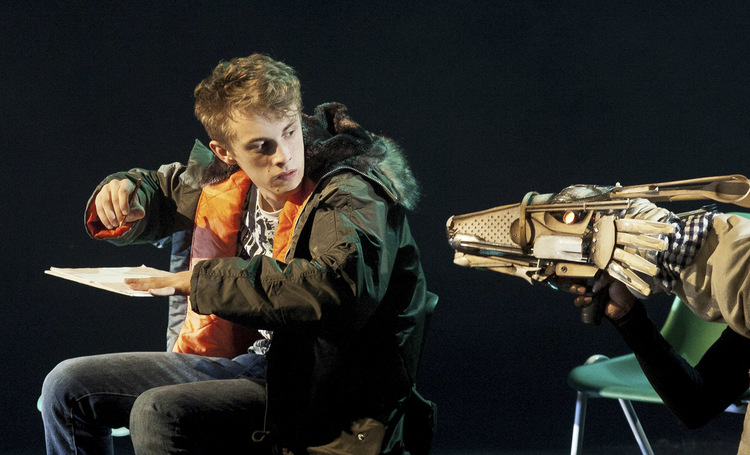@ Citizens Theatre, Glasgow until Sat 10 Oct 2015 and
@ Dundee Rep, from Wed 14 Oct until Sat 17 Oct 2015
On the sad, sad day in which we find ourselves bereft of one of our language’s finest wordsmiths, it seems poignant that Dragon is a production of very few words indeed. Teenage protagonist Tommy has had a tough year: he has lost his mother, is getting bullied at school, and suffers the stifling female attentions of a similarly socially awkward classmate. As though struck mute by the weight of grief and general teenage angst, Tommy begins to see dragons; initially innocuous, emerging from the cityscape, but becoming increasingly more persuasive and domineering. Puppetry, illusion, and physical theatre are weaved together in the second outing of this production, conceived by Jamie Harrison, Oliver Emmanuel, and Candice Edmunds as a co-production between Vox Motus, the National Theatre of Scotland and Tianjin People’s Arts Theatre.
The theatricality of Dragon is laid bare for all to see – there is no hidden magic, no-one pulling the ropes behind the scenes, no “how the bloody hell did they do that”. The actors themselves operate all of the intricate puppets, and manipulate the dynamic, ever evolving set. As a production that proclaims itself to be ‘a show for adults, teenagers and children with vivid imaginations’, perhaps this creates a bit of a problem – the show is asking you to buy in to the classic ‘suspension of disbelief’ that goes alongside traditional theatregoing, but is also showing you quite explicitly how it is put together – so where does imagination slot in to this? Perhaps this is overanalysing something honest, clawing for flaws in something innocent. Perhaps for adults the imagination required is not to believe in the physical manifestation of dragons, but to empathise with the weight of grief being shouldered by an otherwise irritatingly sullen teenager.
Regardless, it’s difficult to fling any more praise at this production; it has been highly lauded here, there, and then back here again. It embodies one of those great moments where both adults and children alike feel the story is speaking only to them, akin to the darkest and juiciest of Roald Dahl stories. I must respectfully disagree with my fellow The Wee Review critic’s reservations regarding the ‘domestic’ scenes, mainly concerning the boy’s father and his bleak wanderings through the madness of grief; far from being tropes worthy of prime-time BBC1, these are in fact acutely realised moments of stillness, full of understanding and connection, yet without a word uttered. That is the gold upon which Vox Motus have struck: the ability to say everything without saying anything. A joyous thing.
